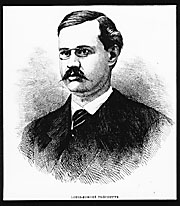
 |
Unofficial Poet Laureate of Quebec From Writers of Montréal
The little boy who would try to explain to himself why that flag hung there when "nous étions français, nous! Nous parlions français, nos livres étaient français. . ." grew up to become the principal literary figure of French-speaking Canada, its unofficial poet laureate, the only nineteenth century French-Canadian writer to be well known outside Canada. His move to Montreal in 1877 from Quebec City also signalled Montreal's newly-assumed status as literary and cultural capital of the province. In a life that included a stint in the proverbial garret and was capped by the Montyon Prize of the Académie Française, Fréchette was, for more than a quarter of a century, the symbol of the ideal man of letters: a poet who had penned over 400 verses, a playwright, essayist, folklorist and short story writer. Radical in his politics, he was also constantly embroiled in polemics, and something of a fraud. The second half of his career was dogged by frequently validated charges of plagiarism. A symbolic precursor of this charge, and one for which Fréchette was not to blame, was his play, Félix Poutré. A popular historical drama based on the memoirs of one Felix Poutre who claimed to have been a leader of the 1837-38 Rebellions, its hero later turned out to be a paid informer working for the military police against the Patriotes. Critics of his day acclaimed Fréchette as "the Lamartine of Canada," evoking the name of the great French Romantic poet and revolutionary politician. His first collections were alternately romantically, then politically inspired. Many of his early lyrical verses were sparked by amorous adventures and bore titles such as "Corinne" and "Juliette." His second book La Voix d'un exilé, was written in Chicago where he exiled himself in 1866 in disgust over the approach of Confederation, which he deemed would end the future of the French-Canadian nation. La Voix d'un exilé was used as propaganda by the Rouge party in Canada. One twentieth-century critic has called its "violence of ... language" unsurpassed in Canadian literature. (A typically incendiary poem implied that Thomas D'Arcy McGee had met his end by assassination for his betrayal of the Irish people.) According to what may be an apocryphal account, when Fréchette became the province's establishment poet in 1880, he bought up all the copies of La Voix he could find and burned them. A lawyer by profession, Fréchette made a stab at politics when he returned to Canada from Chicago in 1871. He sat in the House of Commons for four years but failed to get re-elected. His marriage at age thirty-eight to a Montreal heiress in 1876 changed the course of his life. While he continued to have strong political opinions (his anti-clericalism, in particular, was very controversial in his time), he no longer needed to worry about his financial future and could write full time. Ensconced in a mansion on St. Louis Square, he wrote Les Fleurs boréales, the collection that won him the Montyon prize and assured his reputation. He may have been the first (but would certainly not be the last) Canadian for whom fame abroad meant recognition at home. La Légende d'un peuple, a series of historical tableaux interpreting the emergence of the French-Canadian nation, was published in 1887 and is regarded as Fréchette's finest work. This collection of epic poems reminiscent of Victor Hugo reflects the cult of great men popular in the nineteenth century. Several poems take as their subjects heroes of French Canada such as Dollard des Ormeaux, Jolliet and Papineau. When Fréchette died some twenty years later, few people attended his funeral. Tastes had changed, romanticism was becoming passe, new literary movements frowned on his imitative talent. Yet Fréchette at his best could rise above his own mediocrity. His description of the immense Mississippi, for instance, in the long poem "Jolliet" still stirs the imagination, still plucks at the heart.
|
||
|
| Downtown Montreal Guide | Old Montreal Guide | Guide to Eating Out | Walking Tours | | Urban Landscape | Guide to Literary Montreal | Montreal Vintage Photos | | Montreal Links | Montreal Jazz | www.vehiculepress.com © Véhicule Press, All Rights Reserved |
